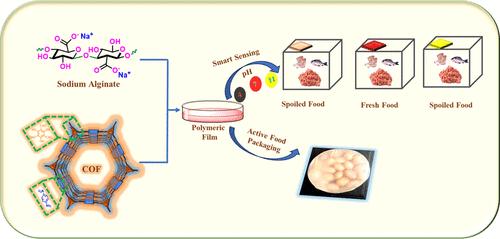Design, Synthesis, and Antimicrobial Activity of Biodegradable Sodium Alginate/COF Polymeric Films for Smart Monitoring of Food Spoilage and Active Food Packaging
IF 2.6
Q2 FOOD SCIENCE & TECHNOLOGY
引用次数: 0
Abstract
As the human population increases very rapidly, it is necessary to develop an efficient biodegradable packaging material to increase the shelf life of food, guarantee food safety, and reduce spoilage from extreme conditions. To overcome all of these problems, herein, we synthesize smart sensing strips and antimicrobial active food packaging films to prevent molding. For smart sensing of food spoilage, covalent organic frameworks (COFs) were synthesized from 2,4,6-triformylphloroglucinol (TFP) and p-phenylenediamine. Thereafter, COF was incorporated into a sodium alginate polymeric material to obtain sensing strips with highly colorimetric response and augmented mechanical properties. Smart sensing strips were demonstrated on packaged poultry meat. The sensing strips are highly pH-responsive and color changes according to the pH of the surrounding. Sensing responses of COF were also studied for the biogenic amines that evolve during the spoilage of meat using cyclic voltammetry. The SA/COF film was characterized through different techniques including atomic force microscopy, field emission scanning electron microscopy, Brunauer–Emmett–Teller, energy-dispersive X-ray spectroscopy, Fourier transform infrared spectroscopy, and powder X-ray diffraction. In addition to this antimicrobial citral was incorporated into the SA/COF film to prepare an active packaging film, which reduces food spoilage from high humidity, molding, and high-temperature conditions. The active packaging film was applied to the peanuts to avoid mold formation, which increases their shelf life and reduces food wastage. Based on the above research, we designed a polymeric film for smart sensing and packaging of food.

用于智能监控食品腐败和活性食品包装的可生物降解海藻酸钠/COF 聚合物薄膜的设计、合成和抗菌活性
随着人类人口的快速增长,有必要开发一种高效的可生物降解包装材料,以延长食品的保质期,保证食品安全,减少极端条件下的腐败变质。为了克服所有这些问题,我们在本文中合成了智能传感条和抗菌活性食品包装膜,以防止霉变。为实现对食品腐败的智能感知,我们用 2,4,6-三甲基氯葡萄糖醇(TFP)和对苯二胺合成了共价有机框架(COF)。随后,将 COF 与海藻酸钠聚合物材料结合,获得了具有高度比色响应和增强机械性能的传感条。在包装禽肉上演示了智能传感条。这种传感条具有很高的 pH 值响应性,颜色会随着周围环境的 pH 值变化而变化。此外,还利用循环伏安法研究了 COF 对肉类腐败过程中产生的生物胺的传感反应。通过原子力显微镜、场发射扫描电子显微镜、布鲁瑙尔-艾美特-泰勒、能量色散 X 射线光谱、傅立叶变换红外光谱和粉末 X 射线衍射等不同技术对 SA/COF 薄膜进行了表征。此外,还在 SA/COF 薄膜中加入了抗菌剂柠檬醛,制备出一种活性包装膜,可减少食品在高湿度、成型和高温条件下的腐败变质。将活性包装膜贴在花生上,可避免霉菌形成,从而延长花生的保质期,减少食品浪费。基于上述研究,我们设计了一种用于食品智能传感和包装的聚合物薄膜。
本文章由计算机程序翻译,如有差异,请以英文原文为准。
求助全文
约1分钟内获得全文
求助全文

 求助内容:
求助内容: 应助结果提醒方式:
应助结果提醒方式:


